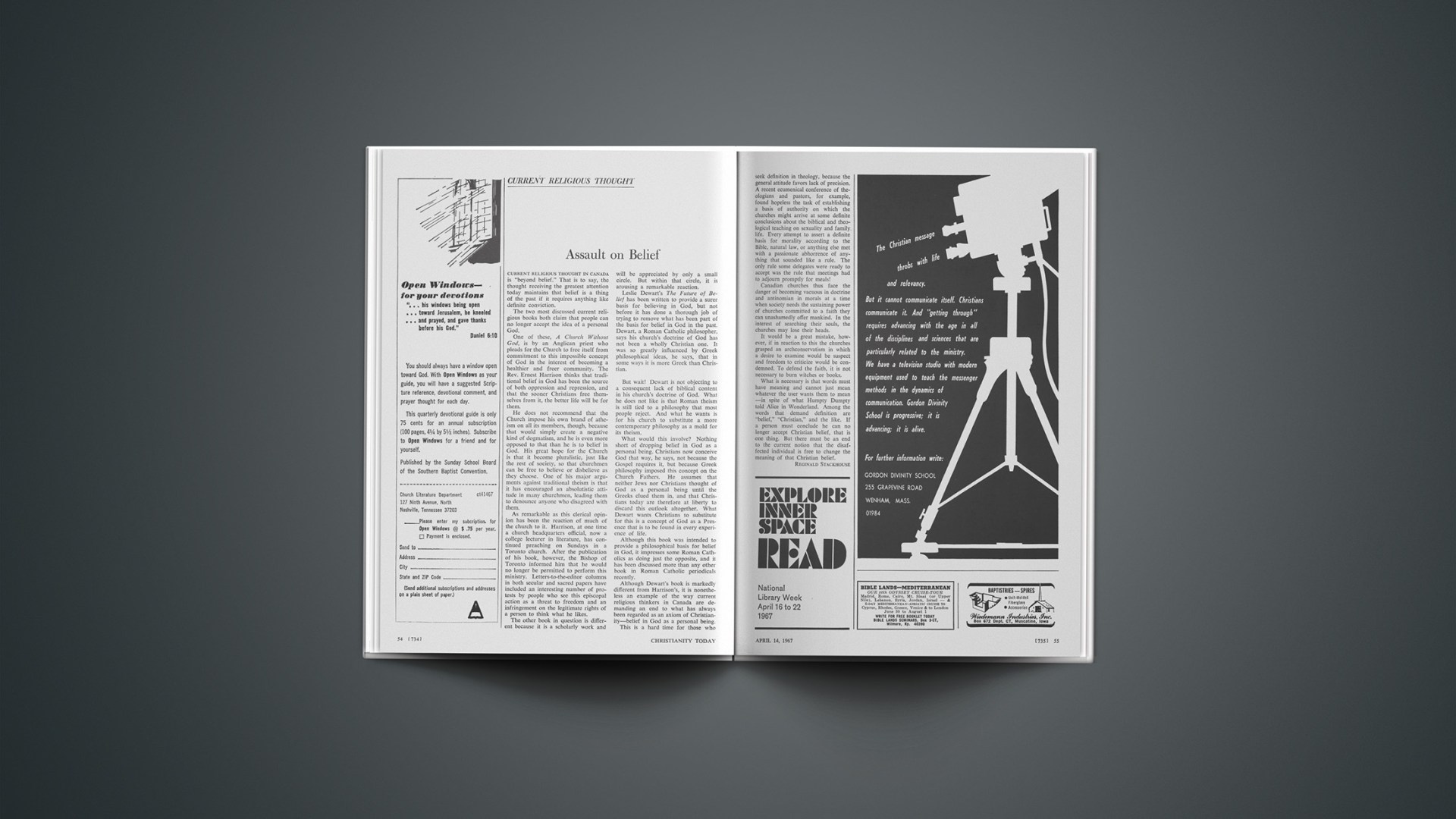Current religious thought in canada is “beyond belief.” That is to say, the thought receiving the greatest attention today maintains that belief is a thing of the past if it requires anything like definite conviction.
The two most discussed current religious books both claim that people can no longer accept the idea of a personal God.
One of these, A Church Without God, is by an Anglican priest who pleads for the Church to free itself from commitment to this impossible concept of God in the interest of becoming a healthier and freer community. The Rev. Ernest Harrison thinks that traditional belief in God has been the source of both oppression and repression, and that the sooner Christians free themselves from it, the better life will be for them.
He does not recommend that the Church impose his own brand of atheism on all its members, though, because that would simply create a negative kind of dogmatism, and he is even more opposed to that than he is to belief in God. His great hope for the Church is that it become pluralistic, just like the rest of society, so that churchmen can be free to believe or disbelieve as they choose. One of his major arguments against traditional theism is that it has encouraged an absolutistic attitude in many churchmen, leading them to denounce anyone who disagreed with them.
As remarkable as this clerical opinion has been the reaction of much of the church to it. Harrison, at one time a church headquarters official, now a college lecturer in literature, has continued preaching on Sundays in a Toronto church. After the publication of his book, however, the Bishop of Toronto informed him that he would no longer be permitted to perform this ministry. Letters-to-the-editor columns in both secular and sacred papers have included an interesting number of protests by people who see this episcopal action as a threat to freedom and an infringement on the legitimate rights of a person to think what he likes.
The other book in question is different because it is a scholarly work and will be appreciated by only a small circle. But within that circle, it is arousing a remarkable reaction.
Leslie Dewart’s The Future of Belief has been written to provide a surer basis for believing in God, but not before it has done a thorough job of trying to remove what has been part of the basis for belief in God in the past. Dewart, a Roman Catholic philosopher, says his church’s doctrine of God has not been a wholly Christian one. It was so greatly influenced by Greek philosophical ideas, he says, that in some ways it is more Greek than Christian.
But wait! Dewart is not objecting to a consequent lack of biblical content in his church’s doctrine of God. What he does not like is that Roman theism is still tied to a philosophy that most people reject. And what he wants is for his church to substitute a more contemporary philosophy as a mold for its theism.
What would this involve? Nothing short of dropping belief in God as a personal being. Christians now conceive God that way, he says, not because the Gospel requires it, but because Greek philosophy imposed this concept on the Church Fathers. He assumes that neither Jews nor Christians thought of God as a personal being until the Greeks clued them in, and that Christians today are therefore at liberty to discard this outlook altogether. What Dewart wants Christians to substitute for this is a concept of God as a Presence that is to be found in every experience of life.
Although this book was intended to provide a philosophical basis for belief in God, it impresses some Roman Catholics as doing just the opposite, and it has been discussed more than any other book in Roman Catholic periodicals recently.
Although Dewart’s book is markedly different from Harrison’s, it is nonetheless an example of the way current religious thinkers in Canada are demanding an end to what has always been regarded as an axiom of Christianity—belief in God as a personal being.
This is a hard time for those who seek definition in theology, because the general attitude favors lack of precision. A recent ecumenical conference of theologians and pastors, for example, found hopeless the task of establishing a basis of authority on which the churches might arrive at some definite conclusions about the biblical and theological teaching on sexuality and family, life. Every attempt to assert a definite basis for morality according to the Bible, natural law, or anything else met with a passionate abhorrence of anything that sounded like a rule. The only rule some delegates were ready to accept was the rule that meetings had to adjourn promptly for meals!
Canadian churches thus face the danger of becoming vacuous in doctrine and antinomian in morals at a time when society needs the sustaining power of churches committed to a faith they can unashamedly offer mankind. In the interest of searching their souls, the churches may lose their heads.
It would be a great mistake, however, if in reaction to this the churches grasped an archconservatism in which a desire to examine would be suspect and freedom to criticize would be condemned. To defend the faith, it is not necessary to bum witches or books.
What is necessary is that words must have meaning and cannot just mean whatever the user wants them to mean—in spite of what Humpty Dumpty told Alice in Wonderland. Among the words that demand definition are “belief,” “Christian,” and the like. If a person must conclude he can no longer accept Christian belief, that is one thing. But there must be an end to the current notion that the disaffected individual is free to change the meaning of that Christian belief.










